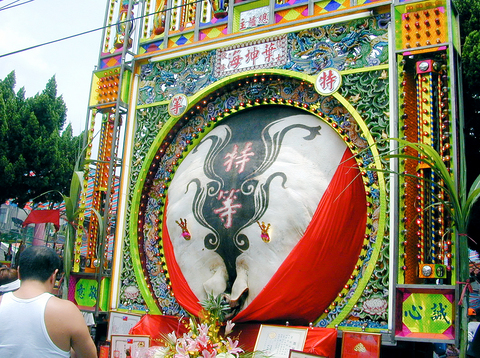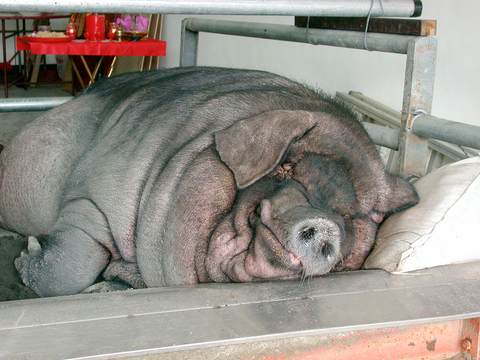The belief that "the bigger the sacrificed pig, the more luck a person will have for the rest of the year" has resulted in a lifetime of agony for hundreds of pigs, bred by farmers to become abnormally overweight before slaughter, animal-rights activists said yesterday.
Dozens of activists from several animal-rights groups yesterday gathered in front of the Council of Agriculture (COA) to protest traditional pig contests, saying the government has failed to regulate abusive practices toward animals.
Showing a documentary about pigs selected for the contest, activists said that 15 to 18 months before the overweight pigs are killed as sacrificial offerings, they are deprived of fluids, exercise and even turning over freely. The pigs undergo these cruel farming practices until their weight reaches upwards of five to six times their normal weight, activists said.

PHOTO: LIANG HSIU-HSIEN, TAIPEI TIMES
According to a recent survey by the Environment and Animal Society of Taiwan (EAST), the price for a 600kg pig is about NT$200,000 (US$6,228). And the price goes up with the weight. A 900kg pig costs about NT$3.5 million.
EAST director Chen Yu-min (
"The obesity even leaves pigs paralyzed. On hot summer days, some even die of [heat-related] sickness," Chen said.

PHOTO COURTESY OF THE ENVIRONMENT AND ANIMAL SOCIETY OF TAIWAN
The survey suggests that there are about 80 farms that raise an average of 650 pigs for such contests, and more than half of them are in Taoyuan County. In 2003, more than 30 deaths of overweight pigs in Taoyuan were reported.
Chen said some farmers even pour metal into their pigs before a contest in order to increase the swine's weight, which is why contest holders have to use metal detectors to check overweight pigs.
Chen said that pigs with thick fat are slaughtered publicly without being stunned. Butchers usually cut the throats of pigs as they are suspended upside down with their legs tightly bound. The process is often accompanied by the pigs' bloodcurdling screams. According to the Husbandry Law (畜牧法), pigs cannot be slaughtered without being stunned in advance, Chen said. However, violations of the law have been neglected by the government for a long time, he said.
In recent years, activists have launched a campaign against the pig contests. A few temples or religious groups have used "alternative pigs," which are made from flowers, fruit, rice cakes or other environmentally friendly materials.
Activists said that traditional briefs leading to animal abuse violate existing laws, but the government has rarely taken action against offenders.
Accompanied by Democratic Progressive Party Legislator Tien Chiu-chin (田秋堇), the activists were met by COA Deputy Minister Hu Fu-hsiung (胡富雄), who promised to order local authorities to try to persuade farmers to abandon cruel farming practices.
"If they keep violating the Animal Protection Law [動物保護法], the pigs will be confiscated," Hu said.

An essay competition jointly organized by a local writing society and a publisher affiliated with the Chinese Communist Party (CCP) might have contravened the Act Governing Relations Between the People of the Taiwan Area and the Mainland Area (臺灣地區與大陸地區人民關係條例), the Mainland Affairs Council (MAC) said on Thursday. “In this case, the partner organization is clearly an agency under the CCP’s Fujian Provincial Committee,” MAC Deputy Minister and spokesperson Liang Wen-chieh (梁文傑) said at a news briefing in Taipei. “It also involves bringing Taiwanese students to China with all-expenses-paid arrangements to attend award ceremonies and camps,” Liang said. Those two “characteristics” are typically sufficient

A magnitude 5.9 earthquake that struck about 33km off the coast of Hualien City was the "main shock" in a series of quakes in the area, with aftershocks expected over the next three days, the Central Weather Administration (CWA) said yesterday. Prior to the magnitude 5.9 quake shaking most of Taiwan at 6:53pm yesterday, six other earthquakes stronger than a magnitude of 4, starting with a magnitude 5.5 quake at 6:09pm, occurred in the area. CWA Seismological Center Director Wu Chien-fu (吳健富) confirmed that the quakes were all part of the same series and that the magnitude 5.5 temblor was

The brilliant blue waters, thick foliage and bucolic atmosphere on this seemingly idyllic archipelago deep in the Pacific Ocean belie the key role it now plays in a titanic geopolitical struggle. Palau is again on the front line as China, and the US and its allies prepare their forces in an intensifying contest for control over the Asia-Pacific region. The democratic nation of just 17,000 people hosts US-controlled airstrips and soon-to-be-completed radar installations that the US military describes as “critical” to monitoring vast swathes of water and airspace. It is also a key piece of the second island chain, a string of

The Central Weather Administration has issued a heat alert for southeastern Taiwan, warning of temperatures as high as 36°C today, while alerting some coastal areas of strong winds later in the day. Kaohsiung’s Neimen District (內門) and Pingtung County’s Neipu Township (內埔) are under an orange heat alert, which warns of temperatures as high as 36°C for three consecutive days, the CWA said, citing southwest winds. The heat would also extend to Tainan’s Nansi (楠西) and Yujing (玉井) districts, as well as Pingtung’s Gaoshu (高樹), Yanpu (鹽埔) and Majia (瑪家) townships, it said, forecasting highs of up to 36°C in those areas